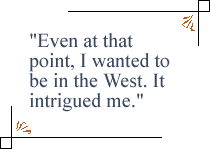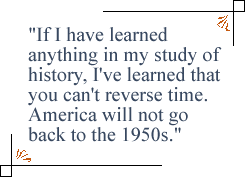|
|
|
The year before Taylor's graduation, Martin Luther King was assassinated and many cities were in flames. The University of Minnesota made an effort to recruit African-American graduate students for its history department, sending a recruiter to St. Augustine's who talked to Taylor. "Out of 750 graduate students in the Minnesota history department, they reserved four slots for African Americans. Well, three actually showed up and only two of us stayed," he recalls. In Minneapolis, Taylor was trained as an urban historian. His mentor, Alan Spear, had done a classic study of black history in Chicago. "We hoped to achieve an understanding of contemporary black urban society by looking at the past," he says. 
But the pull of the West again hit Taylor. After getting his master's in 1971, there was an opening in Pullman in the Black Studies Program. "Even at that point, I wanted to be in the West. It intrigued me," he says. Ironically, it was because of his Eastern degree that he was hired. "Talmadge Anderson, the director of the program, was a graduate of St. Augustine's. I think he hired me primarily because I was one, too." Taylor spent four years in the Palouse, and the last one he was on leave making South by Northwest. He then returned to Minneapolis and earned his Ph.D. from the University of Minnesota. After graduation, he went West again to the California Polytechnical State University in San Luis Obispo, Calif. "Cal Poly attracted mostly technical types of students. They were very proud of the fact that they never had a demonstration there during the entire Vietnam War," Taylor says. Taylor might have been reluctant to go, but he says he wasn't ready yet for an intense research institution. "It was a teaching institution. I ended up writing a lot, even though it wasn't required for tenure and promotion," he recalls. Another western institution, the University of Oregon, lured him away in 1990. His rise in the history department was swift; he became chair in 1997 but made his decision to leave just a year later. "There were many advantages for Washington over Oregon. There are far greater resources here, and I'm not just talking abut the salary. For the first time in my career, I have a more or less permanent research assistant," he explains. "Also, there are four specialists who study black history including me. For the first time in my professional career, I will be in a department with other people doing African-American history." 
Ironically Taylor's decision to come to Washington came just weeks after the state's voters passed Initiative 200, which dismantled affirmative action programs in state agencies, including the UW. Did he hesitate at all after the vote? "No, what we need now are different strategies for access to higher education," he responds. Pointing to a newspaper headline announcing a $1 billion gift by Bill and Melinda Gates to three minority scholarship funds, Taylor adds. "What Bill Gates did today is as important as the rise of affirmative action decades ago. "If I have learned anything in my study of history, I've learned that you can't reverse time. America will not go back to the 1950s." You can e-mail Professor Taylor at qtaylor@u.washington.edu. Tom Griffin is editor of Columns
|
Home / Current Issue / Archives / Talk Back / Advertising / Columns FAQ / Alumni Website / Search